On February 15th and 16th, Laogai Research Foundation hosted an international conference on China’s Great Famine in Washington, DC. From 1959 to 1961, the Chinese people suffered history’s largest famine, which killed an estimated 40 million people. LRF’s conference, “The World’s Greatest Famine: Witnessing, Surviving, Remembering”, brought together academics and authors from around the world to discuss the role Mao Zedong and the Chinese Communist Party played in bringing about the starvation and unnatural deaths of millions. Keynote speakers included Yang Jisheng, author of Tombstone, a comprehensive account of the Great Chinese Famine during the Great Leap Forward; Jasper Becker, author of Hungry Ghosts: Mao’s Secret Famine; and Frank Dikotter, author of Mao’s Great Famine (participant papers can be downloaded at the bottom of the page).
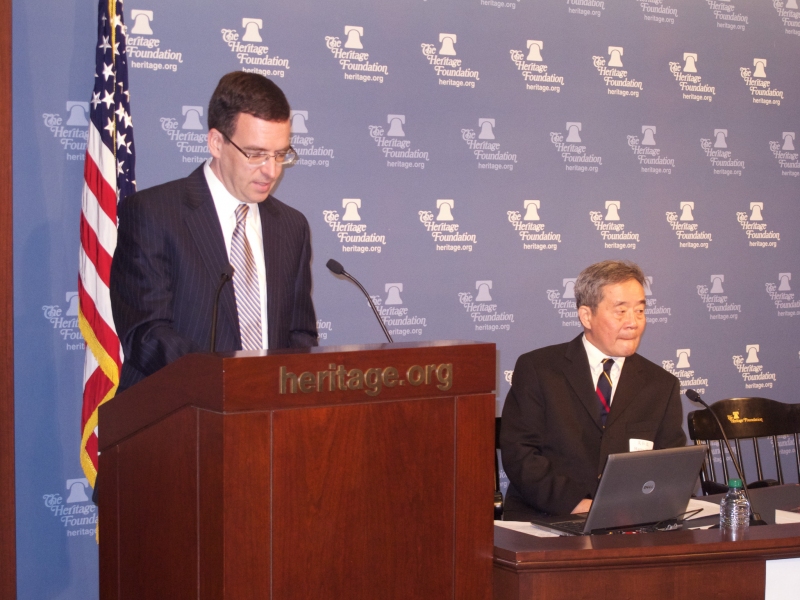
Walter Lohman of Hertiage Foundation opens the conference and introduces Harry Wu. 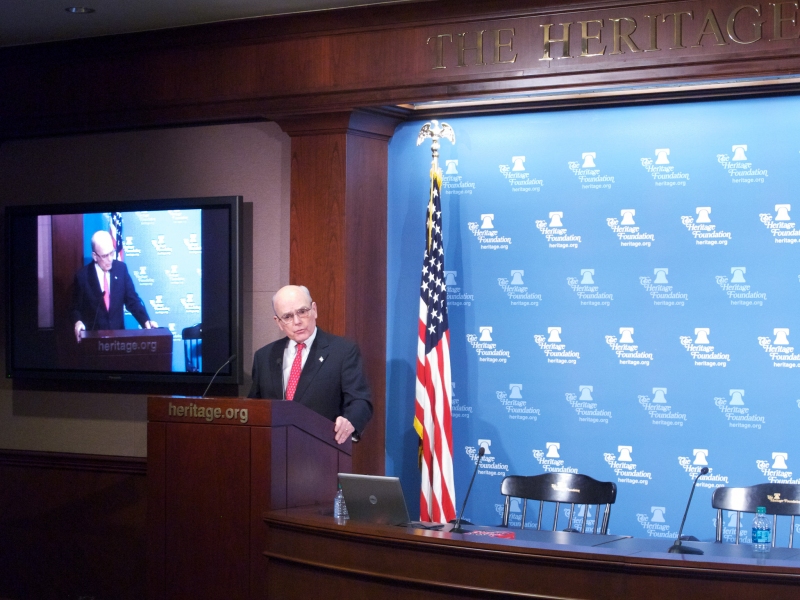
Dr. Lee Edwards discusses the Victims of Communism Memorial Foundation's Online Global Museum on Communism.
Through the support of Dr. Lee Edwards, Chairman of the Victims of Communism Memorial Foundation, day one of the conference was hosted at the Heritage Foundation (for full video of conference, click here). Walter Lohman, Director of the Heritage Foundation’s Asia Studies Center, opened the conference, noting that “the relationship between the U.S. and China is best served by truth and honesty,” and that “all the things that enabled the Great Famine are still in place today.”
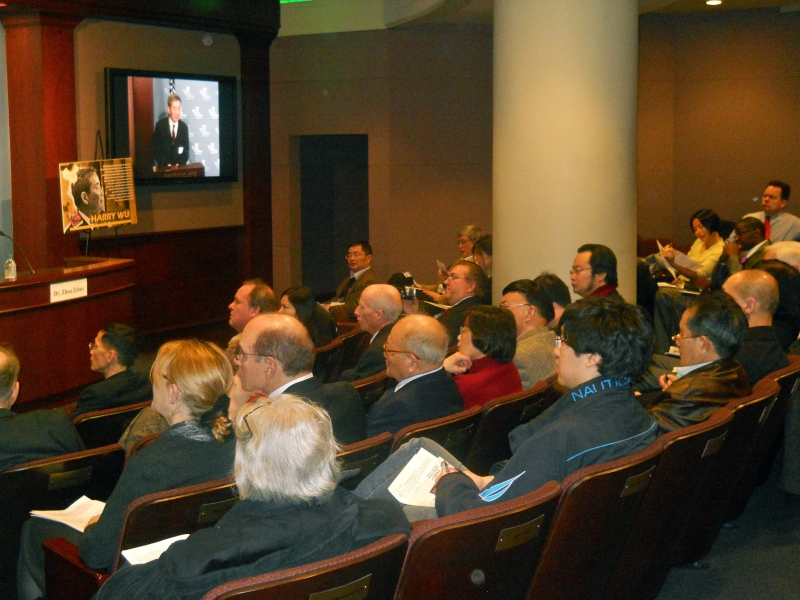
Conference attendees at the Heritage foundation on Feb. 15th.
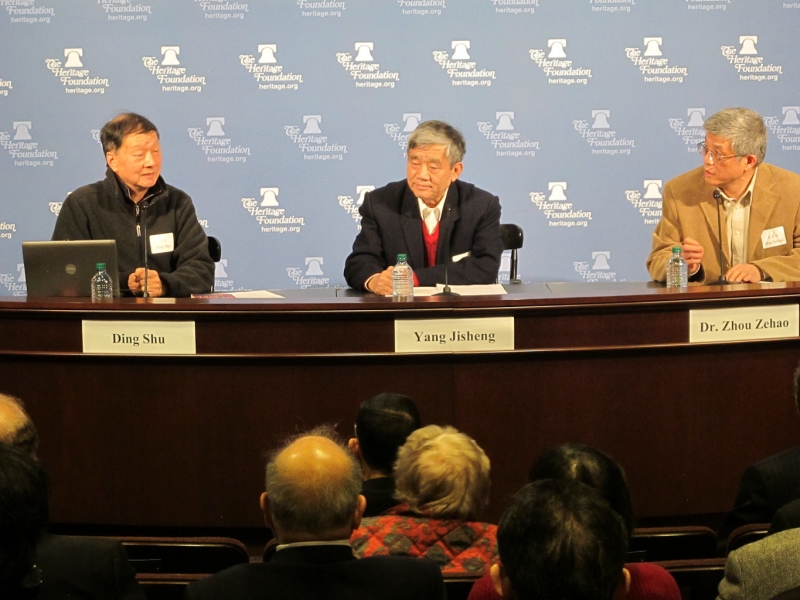
Yang Jisheng (center) discusses his research on the Great Famine, with moderator Ding Shu (left) and interpreter Zhou Zehao (right).
The first speaker, Yang Jisheng, a Communist Party member and former journalist, presented his paper, “How the Chinese Government Dealt with Crisis.” He documented evidence that Chinese government had more than enough food stored to stave off mass famine, yet holds the controversial opinion that these stores were not released because no one in the broken totalitarian system dared to confront Mao Zedong with the harsh reality of the famine.
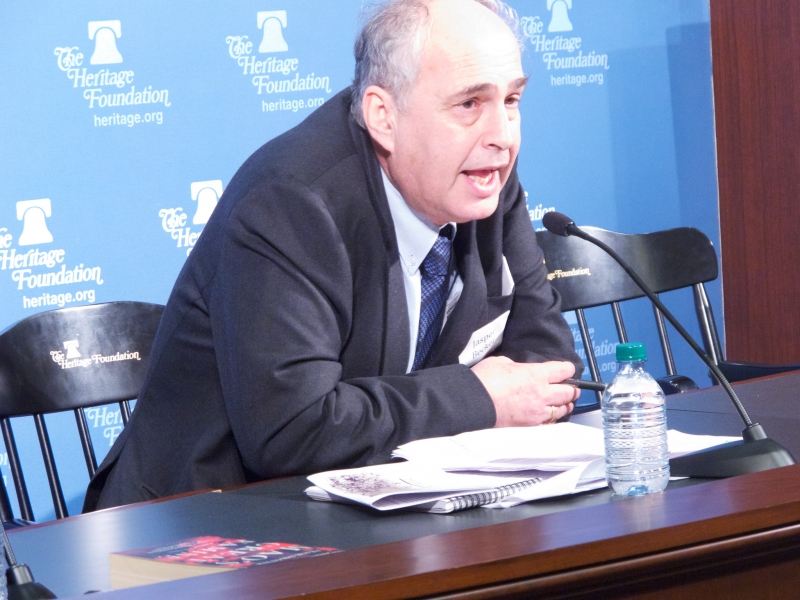
Jasper Becker, author of Hungry Ghosts, dispels the myths that surround China's dark history and present economic and political development.
Other scholars, including Becker and Dikotter, rebuked this analysis, asserting that Mao was well aware of the damage he inflicted upon China’s peasants, and that he did so intentionally. In his paper, “Western Misperceptions of the Great Famine”, Jasper Becker sought to dispel many common myths, stating that there is sufficient evidence that “Party officials must have know what was going on with the famine,” and that Mao was “resorting to mass terror in order to implement a socialist utopia.”
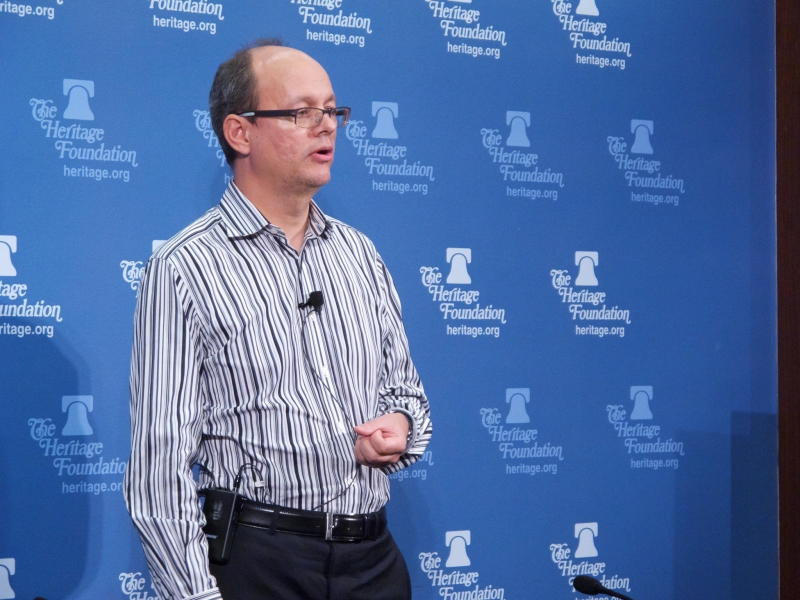
Frank Dikotter details numerous accounts of violence and suffering during the Great Famine.
University of Hong Kong Chair Professor of the Humanities Frank Dikotter discussed his paper, ”The Grey Zone”, a phrase which he uses to describe the fundamental degradation of the nation’s sense of morality from 1958 to 1962. Dikotter’s recent research on the Great Famine is drawn primarily from provincial Chinese Communist Party archives, which revealed that violence was endemic. Many people were punished severely for stealing food – beaten, tortured, and even buried alive, he said. Dikotter emphasized that Chinese “did not merely starve to death, they were being starved to death” by the Communist Party. He noted that millions of the famine’s casualties were in fact beaten to death, and thus the Great Famine should not be cast as a natural phenomenon, but a massive crime against humanity.
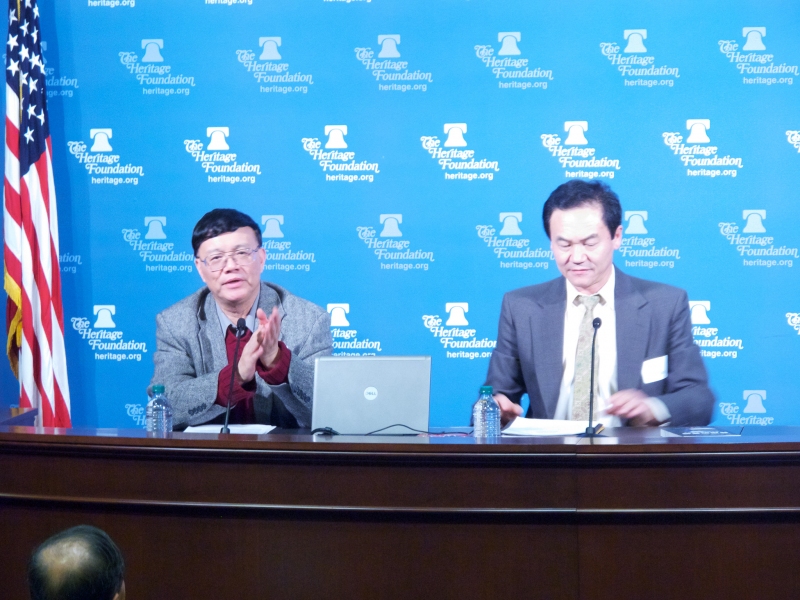
Prof. Guo Jian (right) and moderator Song Yongi (left) discuss academic perspectives on the famine.

Ding Shu discusses the causes of Sichuan's rising death rate throughout the 1950s and '60s (right).
In addition, Pofessor Guo Jian of University of Wisconsin – Whitewater discussed the trend of what he calls “ideology-induced evasion of truth” when it comes to discussions on the Great Famine among China scholars. Chinese scholar Ding Shu stated that Sichuan Province was the origin of the Great Famine, which could be seen by a sharp rise in the region’s death rate in the late 1950s. He said Sichuanese suffered so greatly because the party officials required peasants to contribute such high amounts of food procurement to the state.
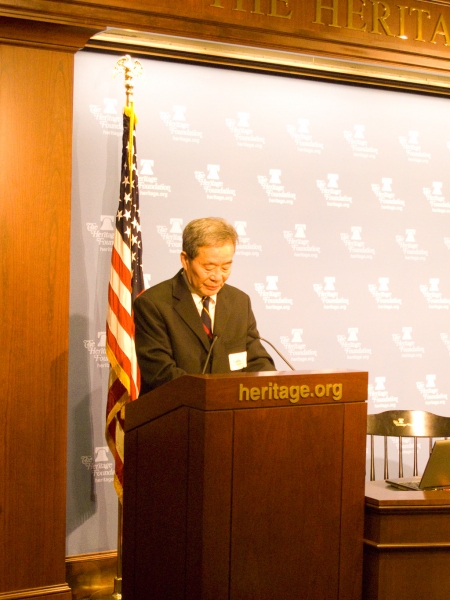
Great Famine survivor Harry Wu tells of starvation inside the Laogai prison camp.
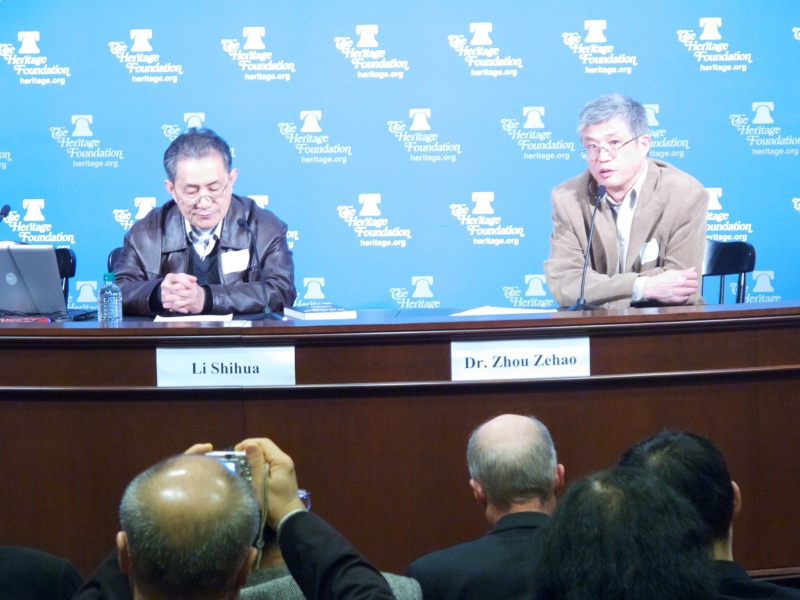
Great Famine survivor Li Shihua tells his family's battle with starvation in 1960.
Shedding light on what it was like to actually experience the Great Famine, LRF founder Harry Wu and survivor Li Shihua described life during the famine. Wu, who was imprisoned in China’s Laogai forced labor prison camp throughout the duration of the famine, told of meager rations, malnutrition, starvation, and death at Qinghe Prison Farm near Beijing. Li, who was in college at the time of the famine, told his family’s tragic story of hunger and loss. Over the course of one month in 1960 his family of 12 became a family of five. Several family members, including his baby niece, died of hunger, while his father and grandfather committed suicide because they could not bear the fact that they could not provide enough food for their family.
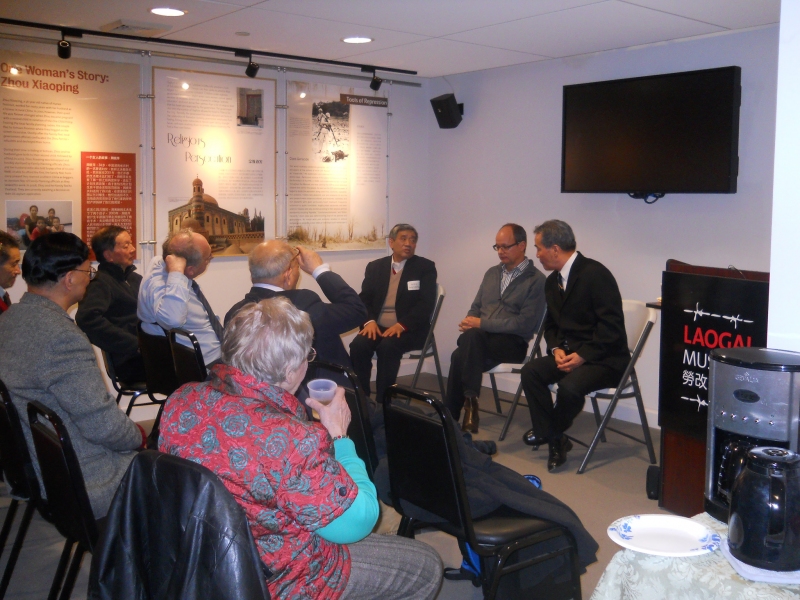
Great Famine experts Yang Jisheng and Frank Dikotter answer questions from participants with moderater Harry Wu.
Day two of the conference, which was held in the Laogai Museum, provided participating scholars and survivors to delve into greater detail about the famine and its impact on individuals and China as a whole. Speakers included survivors Yao Jianfu, Yao Shuping, and Yi Wa, and Cultural Revolution expert and archivist Song Yongyi told of the many horrors that starvation and political upheaval caused in China. University of Chicago graduate Arieh Smith also looked back at the rampant denial and feigned ignorance of the West with regard to this period in China's history. Laogai Research Foundation's Executive Director Harry Wu was pleased that he could finally bring these experts and survivors together to talk about a much ignored era of turmoil. Mr. Wu hopes that as China's economic and political might continue to grow, the world will not forget the real face of Mao Zedong's Communist Party.
| Attachment | Size |
|---|---|
| 161.8 KB | |
| 279.86 KB | |
| 358.33 KB |